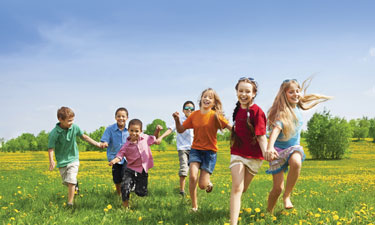 Evidence continues to emerge about the benefits of active, experiential playtime — exploring nature, on the playground, sports, etc. — for those children allowed to engage frequently in such activities. When children are able to spend time at play, their cognitive abilities improve, they learn valuable social skills and their physical health is less likely to deteriorate. But, what can the free-play habits and choices of children all over the world tell us about this most instinctual activity? Yale University researchers Dorothy G. Singer, Jerome L. Singer, Heidi D’Agostino and Raeka DeLong sought to answer that question in their 2009 study, Children’s Pastimes and Play in Sixteen Nations — Is Free-Play Declining? Below, we highlight some of the more interesting findings of the report, which culled data from children and mothers in Argentina, Brazil, China, France, India, Indonesia, Ireland, Morocco, Pakistan, Portugal, South Africa, Thailand, Turkey, the United Kingdom, the United States and Vietnam.
Evidence continues to emerge about the benefits of active, experiential playtime — exploring nature, on the playground, sports, etc. — for those children allowed to engage frequently in such activities. When children are able to spend time at play, their cognitive abilities improve, they learn valuable social skills and their physical health is less likely to deteriorate. But, what can the free-play habits and choices of children all over the world tell us about this most instinctual activity? Yale University researchers Dorothy G. Singer, Jerome L. Singer, Heidi D’Agostino and Raeka DeLong sought to answer that question in their 2009 study, Children’s Pastimes and Play in Sixteen Nations — Is Free-Play Declining? Below, we highlight some of the more interesting findings of the report, which culled data from children and mothers in Argentina, Brazil, China, France, India, Indonesia, Ireland, Morocco, Pakistan, Portugal, South Africa, Thailand, Turkey, the United Kingdom, the United States and Vietnam.
2,400: Number of children whose play habits were studied for the report.
1-12: Age range of children who participated in the study.
72: Percentage of surveyed mothers who say their children regularly spend their free time watching television — this was the most common leisure activity among boys and girls equally and across all 16 countries surveyed.
58: Percentage of surveyed mothers who say their children regularly spend their free time playing outside.
60 versus 63: Percentage of free time spent watching television and playing outside, respectively, as reported by children living in developed countries.
78 versus 49: Percentage of free time spent watching television and playing outside, respectively, as reported by children living in developing countries.
33: Percentage of children surveyed in the United States who say they “often” spend time exploring nature.
5: Percentage of children surveyed in Vietnam who say they “often” spend time exploring nature.
54: Percentage of children surveyed who report being happiest while playing outside at a playground or park.
19: Percentage of children surveyed who report being happiest while playing an electronic game.
72: Percentage of mothers of surveyed children who agreed with the idea that children today are growing up too quickly.
Source: Children’s Pastimes and Play in Sixteen Nations — Is Free-Play Declining?

